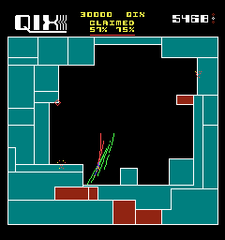Qix
| Qix | |

| |
| Developer: | Taito |
| Publisher: | Taito |
| Game designer: | Randy Pfeiffer and Sandy Pfeiffer |
| Release date: | 1981 |
| Genre: | Retro |
| Game modes: | Up to 2 players, alternating turns |
| Cabinet: | Standard and cocktail |
| Controls: | Joystick; 2 buttons |
| Monitor | |
| Orientation: | Vertical |
| Type: | Raster, standard resolution |
Qix is an arcade game, released by Taito America Corporation in 1981.
Gameplay
The objective of Qix is to claim a certain proportion of the playing field as your own.
At the start of each level, the playing field is just a large, empty rectangle, containing the Qix - a sticklike entity that performs peculiar, erratic motions within the confines of the rectangle.
The player controls a small marker that can move around the edges of the rectangle.
To claim an area of the screen, the player must detach from an edge and draw Stix within the rectangle. Stix are simply lines traced out by moving the marker. When the marker traces out a closed shape, the area enclosed by the shape becomes solid and has been claimed.
The player may draw either Fast Stix, which appear blue when solid, or Slow Stix, which appear red. Slow Stix take longer to draw, but are worth twice as many points.
Once the player has claimed an area, the marker can safely move along the border of that claimed area.
To complete a level, the player must claim 75% or more of the rectangle's area.
This game was intially very popular, although its popularity was supposed to have dwindled when it was discovered there were no patterns to winning as there were in other games such as Pac-Man. This game created the Qix genre, which was mostly used in pornographic games, so that the area which was filled in became the area where a pornographic picture became visible.
Enemies
There are three main kinds of enemies, each of which are fatal to the player.
1. The primary enemy, after whom the game is named, is the Qix. The Qix can only hurt the player if the marker is in the process of drawing Stix. If the Qix touches any of the Stix whilst the marker is drawing, the player loses a life.
2. Sparx are small sparks that travel along the edges of the rectangle and of any claimed area. They have no intelligence and simply follow the path blindly. If one of the Sparx touches the marker, the player loses a life. The Sparx cannot travel along Stix that are currently being drawn.
3. The Fuse appears if the marker stops moving whilst in the process of drawing Stix. Fuses are similar to Sparx, but they travel along the Stix, appearing to 'burn' it in the manner of a real fuse wire. If the Fuse travels all the way to the marker, the player loses a life. The Fuse disappears as soon as the marker starts moving again.
Ports
- Atari 5200 (1982)
- Atari Lynx (1991)
- Game Boy (1990)
- NES (1990)
